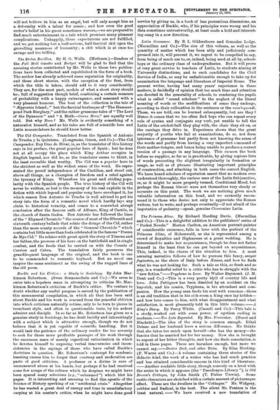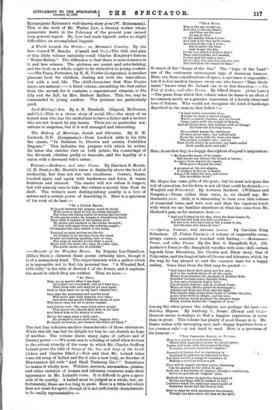The Princess Aline. By Richard Harding Davis. (Macmillan and Co.)—This
is a delightful addition to the publishers' series of " Pocket Novels." Morton Carlton, an American portrait-painter of considerable eminence, falls in love with the portrait of the Princess Aline, of Hohenwald, as she is represented among a crowd of Royalties and Highnesses at a great wedding. He is determined to make her acquaintance, though he does not flatter himself in the least that he can get beyond an acquaintance. This, indeed, is the charm of the situation to him. A most amusing narrative follows of how he pursues this fancy, semper fugientem, as the shore of Italy before Anew, and how he finds what he was not looking for. Such a tale as this, so fresh and so gay, is a wonderful relief to a critic who has to struggle with the "new fiction."—Tryphena in Love. By Walter Raymond. (J. M. Dent and Co.)—This is a very pretty idyll of country life and love. John Pettigrew has been disabled by an accident on the hay-rick, and his cousin, Tryphena, is his attendant and com- panion. How the young man feeds his soul with romance—there is an old tradition that in his sick-room a King once lay hidden— and how love comes to him, with what disappointment and what satisfaction, is most pleasantly told in this little volume.—A King's Diary. By Percy White. (Cassell and Co.)—This tale is a study, worked out with some power, of egotism ending in madness. —Too Late Repented. By Mrs. Forrester. (Hurst and Blackett.)—The idea of the story is common enough. Ethel Delane and her husband have a serious difference. He thinks that she takes too much upon herself—she has the money—she fancies that he married her for her money. How she is brought to repent of her bitter thoughts, and how she finds consolation, is told in these pages. These are harmless enough, but more we cannot say.—Doctor Dick, and other Tales. By Silas Hocking. (F. Warne and Co.)-1 volume containing three stories of the didactic kind, the work of a writer who has had much practice and has attained considerable success in this kind of literature. —Another readable little story, though scarcely on a level with the series in which it appears (the "Pseudonym Library "), is Old Brown's Cottages, by John Smith (T. Fisher Unwin). Some rustic characters are sketched with a certain amount of picturesque effect. These are the dwellers in the " Cottages." Mr. Widgery, cobbler and Radical, is the best. The silent Mr. Pratson is the least natural. — We have received a new translation of
Bjornstjerne Bjornson's well-known story Arne (W. Heinemann). This is the work of Mr. Walter Low, a literary worker whose premature death in the February of the present year caused very general regret. Mr. Low had made liiinself, under no slight difficulties, an accomplished linguist.



















































 Previous page
Previous page